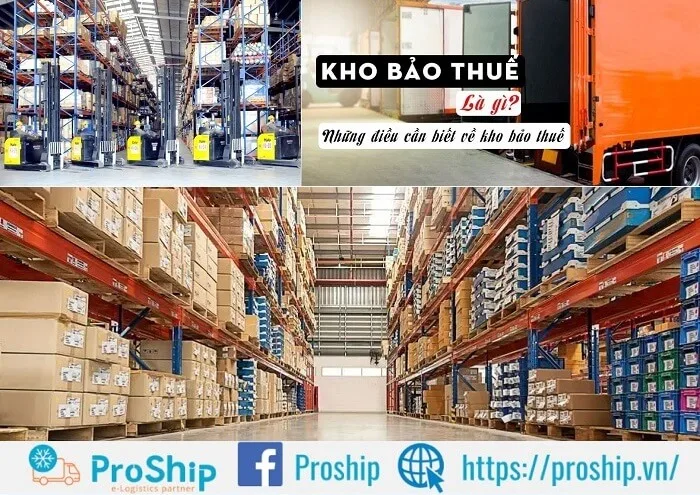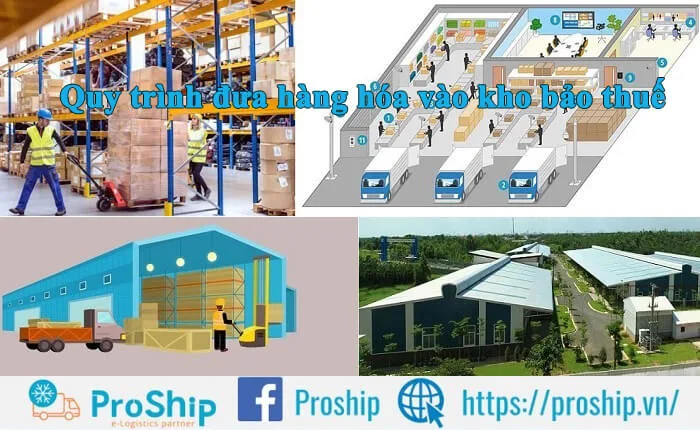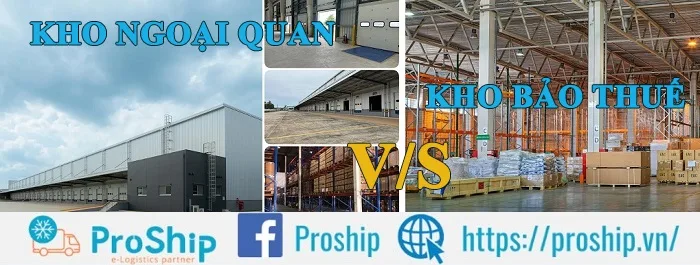x Các doanh nghiệp mới tham gia vào quá trình XNK và có lô hàng thuộc diện cần đưa vào kho bảo thuế nhưng không biết đây là kho gì?
x Các đơn vị cần xây dựng kho bảo thuế cho thuê nhưng chưa biết cần đáp ứng điều kiện, yêu cầu gì?
x Bạn nhầm lẫn giữa kho ngoại quan với kho bảo thuế, thắc mắc không biết chúng giống hay khác nhau? Quy trình đưa hàng vào kho bảo thuế có phức tạp không?
Proship.vn chúng tôi với kinh nghiệm nhiều năm là đơn vị Cho thuê kho ngoại quan (Bonded Warehouse) và kho thường giá rẻ sẽ giải đáp nhanh định nghĩa kho bảo thuế là gì? Cần điều kiện gì để xây dựng kho bảo thuế? Có quy định gì với kho này không?…để quý doanh nghiệp nắm rõ.
Kho bảo thuế là kho gì? Gồm những mặt hàng gì trong kho?
Kho bảo thuế là gì?
Kho bảo thuế là loại kho dùng để lưu trữ nguyên liệu và vật tư nhập khẩu đã được thông quan mà chưa nộp thuế để sản xuất hàng hóa xuất khẩu của chủ kho bảo thuế. Thuật ngữ kho bảo thuế, tiếng Anh là Tax-suspension warehouses.
Trên thực tế, kho bảo thuế là nhà kho được xây dựng bởi các doanh nghiệp xuất khẩu/sản xuất xuất khẩu quy mô lớn, có chức năng lưu trữ nguyên vật liệu để đáp ứng nhu cầu sản xuất hàng hóa của doanh nghiệp.
Việc xây dựng và vận hành của kho bảo thuế được đặt dưới sự giám sát chặt chẽ của phía Cơ quan hải quan và tuân thủ theo quy định pháp luật.

Hàng hóa kho bảo thuế gồm hàng gì?
Các loại mặt hàng được lưu trữ trong kho bảo thuế đa dạng và không giới hạn về chủng loại, mẫu mã mà tùy vào loại hình kinh doanh của doanh nghiệp. Nghĩa là hàng lưu trữ trong kho bảo thuế là KHÔNG GIỚI HẠN, là hàng ĐƯỢC PHÉP lưu hành, kinh doanh, không bị cấm. Điểm chung là các nguyên liệu, vật tư do doanh nghiệp nhập khẩu về và chưa nộp thuế để phục vụ việc sản xuất các mặt hàng xuất khẩu.
Cần có điều kiện gì để xây dựng kho bảo thuế?
Để thành lập kho bảo thuế, doanh nghiệp phải đáp ứng đủ những điều kiện sau:
- Công ty thành lập theo đúng quy định của pháp luật;
- Doanh nghiệp nằm trong diện phải cưỡng chế;
- Doanh nghiệp đáp ứng đủ tiêu chuẩn về hệ thống sổ sách và chứng từ để theo dõi hoạt động hàng xuất nhập kho, XNK theo quy định pháp luật;
- Đảm bảo vị trí xây dựng kho bảo thuế nằm trong khu vực nhà máy để Cơ quan hải quan dễ giám sát và quản lý;
- Khi kho bảo thuế đi vào hoạt động, chủ doanh nghiệp có trách nhiệm phối hợp với cơ quan hải quan trong việc giám sát, kiểm tra kho khi có yêu cầu.
Mọi quyết định liên quan đến thành lập, gia hạn thời gian hoạt động, tạm dừng hay chấm dứt hoạt động kho bảo thuế thuộc về Tổng cục trưởng cục Hải Quan.
Quy trình đưa hàng hóa vào kho bảo thuế
Việc đưa hàng vào kho bảo thuế sẽ được xử lý tương tự như các hàng hóa cần xử lý thủ tục hải quan thông thường khác. Điểm nhanh hơn là các doanh nghiệp không cần nộp thuế để đưa hàng hóa vào kho.

Quy trình đưa hàng vào kho bảo thuế sẽ được thực hiện tuần tự theo các bước:
- Chuẩn bị các chứng từ hàng hóa cần thiết;
- Hoàn thiện việc khai và nộp các chứng từ hải quan;
- Phân luồng hàng hóa;
- Thông quan hàng hóa.
>>Xem thêm: Shipping Marks là gì?
Quyền lợi khi sử dụng kho bảo thuế
Việc sử dụng kho bảo thuế mang lại một số quyền lợi cho doanh nghiệp, cụ thể như sau:
- Miễn thuế và phí nhập khẩu:
Doanh nghiệp được phép lưu trữ hàng trong kho mà không cần nộp thuế và phí nhập khẩu.
- Tăng cường quản lý hàng hóa:
Cung cấp môi trường lưu trữ an toàn và tiện lợi cho hàng hóa, giúp doanh nghiệp quản lý và theo dõi hàng một cách hiệu quả.
- Tiết kiệm chi phí vận chuyển:
Bằng cách tạm giữ hàng trong kho, doanh nghiệp có thể chủ động quản lý lịch trình vận chuyển và tối ưu hóa chi phí vận chuyển.
- Khuyến khích xuất khẩu:
Doanh nghiệp có thể dễ dàng tiếp cận thị trường quốc tế.
- Gia công và chế biến hàng hóa:
Cung cấp cơ hội cho doanh nghiệp thực hiện các hoạt động gia công và chế biến hàng trước khi xuất khẩu, giúp tăng giá trị gia tăng cho sản phẩm.
- Hỗ trợ thủ tục hải quan:
Giúp doanh nghiệp tiếp cận dịch vụ hải quan một cách thuận tiện hơn, giảm thiểu thời gian và công sức thực hiện các thủ tục.
Kho ngoại quan và kho bảo thuế khác nhau thế nào?
Điểm khác nhau giữa kho ngoại quan với kho bảo thuế là gì?

Proship đưa ra bảng so sánh dựa trên các tiêu chí cơ bản giữa kho bảo thuế và kho ngoạn quan như sau:
| TIÊU CHÍ | KHO BẢO THUẾ | KHO NGOẠI QUAN |
| Thời hạn thuê kho | Không quá 12 tháng (tính từ ngày đưa nguyên liệu vật tư vào kho). | Không quá 12 tháng (tính từ ngày đưa hàng vào kho). |
| Loại hàng hóa lưu trữ |
|
|
| Các hoạt động, dịch vụ được thực hiện trong kho |
|
|
Kho bảo thuế là gì cùng quy định liên quan tới việc thành lập, xây dựng kho, so sánh sự khác nhau cơ bản giữa kho bảo thuế với kho ngoại quan đã được chia sẻ chi tiết…Proship Logistics tự hào là đơn vị chuyên Cho thuê kho ngoại quan Bonded Warehouse giá rẻ, quý khách có nhu cầu liên hệ ngay 0909 344 247.

